

Students focus too much on grades to the detriment of learning (essay) One of my engineering students came to see me recently asking to drop a class late.
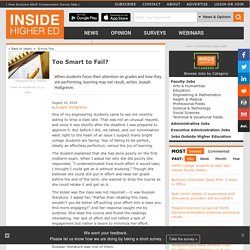
That was not an unusual request, and since it was shortly after the deadline I was prepared to approve it. But before I did, we talked, and our conversation went right to the heart of an issue I suspect many bright college students are facing: fear of failing to be perfect, ideally an effortless perfection, versus the joy of learning. Stress management can help more students succeed in college (essay) I’ve spent a decade teaching college success strategies to mostly nontraditional first-year students.
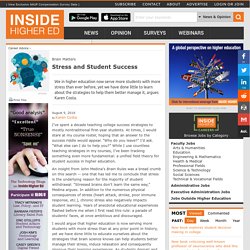
At times, I would stare at my course roster, hoping that an answer to the success riddle would appear. “Why do you leave?” I’d ask. “What else can I do to help you?” The Variables Governing the ‘Rise and Fall of Nations’ The Rise and Fall of Nations: Forces of Change in the Post-Crisis World by Ruchir Sharma Published in June of 2016.
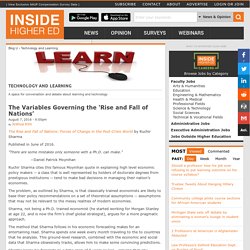
"There are some mistakes only someone with a Ph.D. can make. " --Daniel Patrick Moynihan. Defining students as nontraditional is inaccurate and damaging (essay) After spending 15 years in college and university administration, mainly at two-year colleges, and the past two years as a faculty member in a community college leadership doctoral program, I have become increasingly frustrated by the perpetuation of what I refer to as the myth of the nontraditional student.
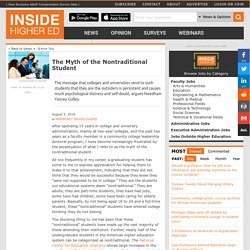
All too frequently in my career, a graduating student has come to me to express appreciation for helping them to make it to that achievement, indicating that they did not think that they would be successful because they knew they “were not supposed to be in college.” They are the students our educational systems deem “nontraditional.” They are adults, they are part-time students, they have had jobs, some have had children, some have been caring for elderly parents.
Basically, by not being aged 18 to 24 and a full-time student, these “nontraditional” students have entered college thinking they do not belong. Can colleges truly teach critical-thinking skills? (essay) “The university seeks to foster in all its students lifelong habits of careful observation, critical thinking, creativity, moral reflection and articulate expression.” “… University fosters intellectual inquiry and critical thinking, preparing graduates who will serve as effective, ethical leaders and engaged citizens.”
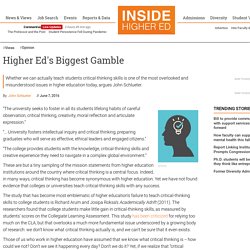
“The college provides students with the knowledge, critical-thinking skills and creative experience they need to navigate in a complex global environment.” These are but a tiny sampling of the mission statements from higher education institutions around the country where critical thinking is a central focus. Indeed, in many ways, critical thinking has become synonymous with higher education. What Shall I Call Myself? “Negotiate salary, never titles” is the advice I give undergraduates.
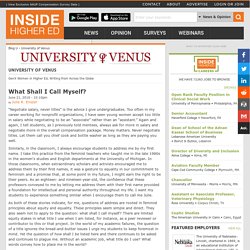
Too often in my career working for nonprofit organizations, I have seen young women accept too little in salary while negotiating to be an “associate” rather than an “assistant.” Again and again, I tell students, as I previously told mentees, always ask for more in salary and negotiate more in the overall compensation package. Money matters. Never negotiate titles. Why Higher Ed Must Resist the ‘Platform Revolution’ Platform Revolution: How Networked Markets Are Transforming the Economy--And How to Make Them Work for You by Sangeet Paul Choudary and Marshall W.
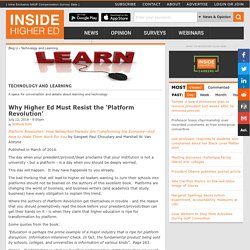
Van Alstyne Published in March of 2016. The Slippery Business of Plagiarism. Plagiarism is a widespread problem around the world.
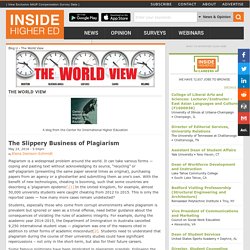
It can take various forms — coping and pasting text without acknowledging its source, “recycling” or self-plagiarism (presenting the same paper several times as original), purchasing papers from an agency or a ghostwriter and submitting them as one’s own. With the benefit of new technologies, cheating is booming, such that some countries are describing a ‘plagiarism epidemic’.[1] In the United Kingdom, for example, almost 50,000 university students were caught cheating from 2012 to 2015. This is only the reported cases — how many more cases remain undetected? Students, especially those who come from corrupt environments where plagiarism is prevalent but ignored or seen as a trivial offense, need better guidance about the consequences of violating the rules of academic integrity. Pennsylvania State U sees surge of interest in short, skills-based faculty development program.
Pennsylvania State University is rethinking how it trains future faculty members after doctoral students flocked to a crash course in online teaching.
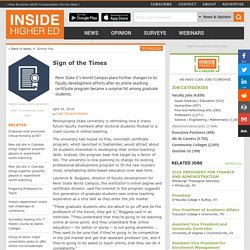
The university had hoped its free, noncredit certificate program, which launched in September, would attract about 30 students interested in developing their online teaching skills. Instead, the program beat that target by a factor of ten. Are You a Student of Higher Education? Are you a student of higher education?
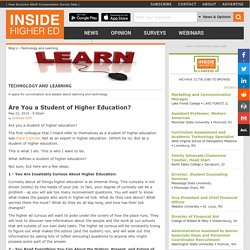
The first colleague that I heard refer to themselves as a student of higher education was Dave Cormier. Not as an expert in higher education. (Which he is). Reflections After Class. In the Internet Law and Policy class I am currently teaching, this week we talked about consumer privacy. We began with an overview of the five areas of U.S. privacy law: Constitutional Privacy; Government Surveillance; Information Privacy; Privacy Torts; and Administrative Law Privacy (e.g. Banking, Consumer Bureau and Federal Trade Commission). Last night in particular we talked about fair information practices (notice; ability to see and correct records; disclosure rules; administrative, technical and physical security). Naturally, we compared European Union (and, for that matter, most of the developed world’s) data privacy approach (comprehensive, but not deep) to the United States’ (sectoral, but deep).
Interestingly, we asked how market, legal, normative and technical factors encroach on traditional expectations of personal privacy … and yet how those factors may also be in the process of creating expectations. Q&A with author of new book on how parenting affects student outcomes. While doing fieldwork in 2004, Laura Hamilton, now an associate professor of sociology at the University of California at Merced, observed how parents interacted with their college-age daughters during and after move-in day. Some parents -- those fussing over the arrangements of their daughter’s bedroom or making phone calls to the university to figure out when, exactly, their child should expect the campus shuttle to arrive each morning -- became a regular presence on the residence hall floor throughout the year. Some stayed only long enough to make sure their daughters were settled, skipping orientations and receptions to honor their child’s newly found independence.
Other parents were not present on move-in day at all, as they could not afford to take time off work. Hamilton observed and interviewed those daughters for the next five years as they attended an unnamed public flagship institution. Hamilton responded to questions about her book. The 5 Places I Get Information. Where do you get your information? The average American spends more than 490 minutes per day consuming some sort of media. That is more than 8 hours. I’d say that I’m consuming some form of media during many more than 8 hours a day. More like close to every waking hour. Take Your Teaching Online: the Micro-Lecture. Travis Grandy is a PhD student in Composition and Rhetoric at the University of Massachusetts Amherst.
Find him on Twitter @travisgrandy or at his website. Whether you want to supplement instruction for your in-person class or you teach a fully online course (like me), you're probably looking for effective ways to deliver content and maintain student engagement. Online learning is a different landscape thanks to sites like Khan Academy, the rapid adoption of MOOCs, and digital pedagogies (including blended and flipped classrooms). University Title Generator website pokes fun at administrative bloat. Is a career as an assistant liaison to athletic maintenance to the task force on employee partnerships in your future? Or how about as an associate provost for the deputy provost for facilities climate for the subcommittee for investor partnerships? It pays well -- $393,369 a year. Those are some of the job titles produced by the University Title Generator, a website that pokes fun at administrative bloat at colleges and the creative job titles it has spawned (and, perhaps on a less amusing note, the hefty salaries that come with some of those titles).
Rutgers Graduate School faculty takes a stand against Academic Analytics. The Millennial Learners. 20 Ways Instructional Designers Are Ruining My Meetings. Memo to the Candidates. Memo to the Candidates, Part II. Ken Burns uses Jefferson Lecture to defend the humanities and the role of narrative. The Day After Mother’s Day.